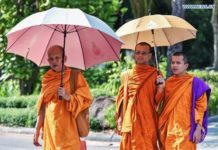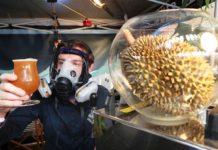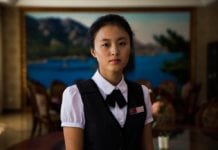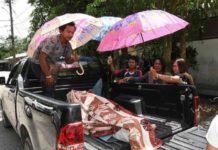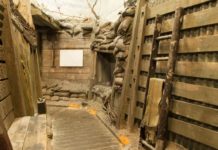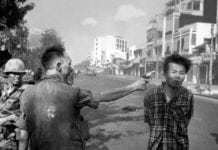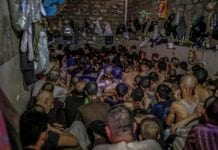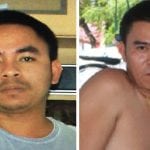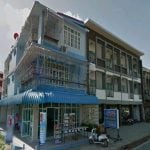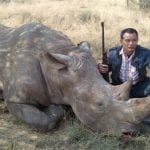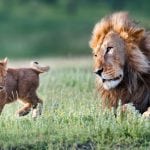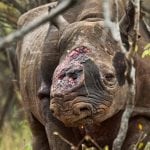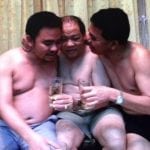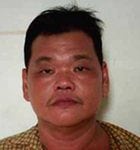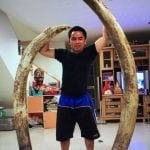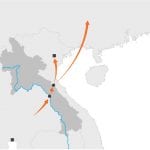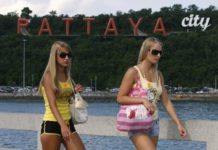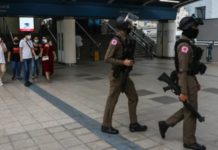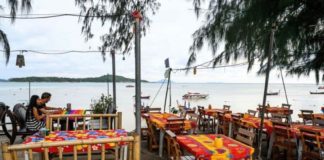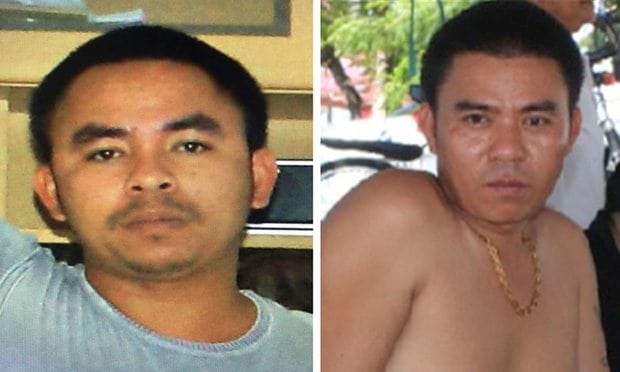
The Bach brothers, based in #Vietnam and #Thailand, are responsible for smuggling thousands of tonnes of elephant ivory, rhino horn and other endangered species.
There is a simple reason why there is always trouble in Nakhon Phanom. It is the reason why the US air force came here during the Vietnam war, and the reason why this dull and dusty town in north-east Thailand now serves as a primary gateway on the global animal trafficking highway. It is all to do with geography.
Nakhon Phanom, population 30,000, sits on the western bank of the Mekong river and is directly opposite the shortest route across Laos, on the other side of the river, and into Vietnam.
For the US air force it was the closest allied territory to Hanoi, 380km (236 miles) away as the bomber flies. For the wildlife traffickers, it is the perfect place for business.
To the west, Thailand has some of the best air and sea connections in South East Asia; and to the east, across the narrow strip of Laos, are the markets of Vietnam and China, bursting with the wealth of their new economies and hungry for the flesh, skin, claws and bones of exotic wildlife.
Today the Guardian exposes the crime family that controls this gateway. And we name three mainstream Lao companies with powerful political connections as leading brokers in the global trafficking of wildlife.
Together with other suppliers they have been trading many tonnes of elephant tusk, rhino horn and lion bone from Africa and truckloads of tigers, turtles, snakes, monkeys and pangolin anteaters from Asia. A substantial amount of their business is illegal.
All of these traders earn a good living; the kingpins are millionaires. All the animals they handle lose their freedom; almost all of them also lose their lives. Some species are now facing extinction as they are shovelled relentlessly into this booming black market.
Analysis Animal trafficking: the $23bn criminal industry is policed by a toothless regulator. The Convention on International Trade in Endangered Species (Cites) finds itself confronting powerful networks, even though it has no detectives, no police powers and no firearms.
The investigation has been led by a counter-trafficking organisation, Freeland, which is based in Bangkok and has previously exposed key players in this trafficking network.
But when law enforcement agencies failed to act, Freeland pushed deeper, working with a Thai government surveillance team, persuading some of the traffickers to talk to them and stepping round the corrupt public officials who guard the network to gather intelligence from reliable police sources in Africa and Asia.
Freeland has shared its evidence with the Guardian in the hope it will finally jumpstart cross-border police action against this and other networks.
Over the past year, we have followed Freeland’s work, met key informants and the head of the surveillance team, and widened the investigation into other parts of the supply lines that link African bush and Asian forest to the plush new suburbs of Hanoi and Beijing.
Told now in full for the first time, this is the story of the Asian connection.
The Asian connection
The secret life of Nakhon Phanom revolves around one crime family, the Bachs. Four wildlife traffickers, speaking independently, name two of the Bach brothers as the key players who control the smuggling gateway from Thailand into Laos: Bach Mai, known to his friends as ‘Boonchai’, 38; and his older brother, Bach Van Limh, 45.
Although they are active in Thailand, the brothers are originally Vietnamese and have networks in both countries.
Boonchai runs the operation in Nakhon Phanom with a dozen men and a handful of women. The surveillance team has seen them meeting African wildlife traders, unloading meat from refrigerated trucks, loading cars with hidden compartments and delivering a package to local police.
Bank records show Boonchai’s girlfriend, who acts as cashier for the business, has sent money to Asian wildlife suppliers. Apart from the export of wildlife through Laos, Thai police intelligence reports also link Boonchai with the importing of drugs from Laos into Thailand.
His older brother, Bach Van Limh, runs the Vietnamese end, from a town called Son Tay, which is strategically placed just inside the border from Laos and a few hours by road from Hanoi.
He originally set up the family business in Nakhon Phanom some 15 years ago but recently left, allegedly after Thai police started investigating his involvement in the drugs trade.
In Son Tay, according to Vietnamese police sources, Bach Van Limh is involved in running prostitutes and in smuggling cars as well as wildlife. He owns a hotel, a cafe and legitimate businesses trading gold and placing migrant workers.
The Bachs are key players in a busy market, buying from whoever will sell to them. Among numerous smaller suppliers, three Lao companies have been operating for as long as the Bach brothers.
One is already notorious in the animal world: the Xeosavang Trading Company run by Vixay Keosavang, who has been hammered by a combination of policing and publicity, much of it organised by Freeland.
But just as the Bachs, until now, have escaped public attention, so too have the other Lao companies. Vinasakhone and Vannaseng are big players – both breaking the law and both still enjoying one of the world’s most destructive trades.
All three Lao companies opened wildlife farms in the early 2000s. They imported tigers bred in captivity, which was legal so long as they were used for science and education, not for commercial trade.
One of them – Vannaseng – illegally imported 2,000 macaque monkeys captured and sold by villagers in Cambodia, according to an internal Lao government report. All three companies went on to break international and Lao law.
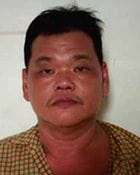
At that time, the Bach brothers were already smuggling wildlife, primarily from a dealer widely known as ‘Fatty’, though his real name is Leuthai Tiewcharoen.
He ran a farm in Nonthaburi, just outside Bangkok, where he stored and bred animals he had illegally smuggled into the country – tigers from Myanmar and Malaysia as well as bears, snakes and turtles.
According to a source who worked at the farm, Fatty was earning 500,000 Thai baht ($14,400) a week killing these animals in a special slaughter area and shipping the carcasses eastwards to be used in food and medicine and as jewellery and home decoration.
Sometimes, he sent them across the Mekong himself. There was a standard technique that Fatty and other Thai traffickers used, according to the source.
The trafficker would go to a remote spot on the Thai side of the river, signal to a contact on the Lao side and drop a carcass in a sealed body bag into the water.
The Lao contact would row over, haul the bag back across the river, weigh it and then make a phone call to send money to the trafficker’s bank account. Some of these consignments would go straight into the farms set up on the Lao side of the Mekong by the three big companies.
But, according to the source, Fatty also routinely sent carcasses direct to his best smuggling contacts – the Bach brothers.
The South African link
One day late in 2002 or early in 2003, Fatty came up with a new scheme. He had met an ambitious man called Chumlong Lemonthai, then aged 35, who had been earning a living selling fruit in a street market in Bangkok but who wanted to move into the wildlife trade.
Chumlong reckoned he knew somebody who could provide rhino horn, originally sourced from Africa, and bones of big cats from the dry forests of central Thailand.
Fatty set up a meeting between Chumlong and the Bach brothers at his farm, hoping to earn a commission as a middleman. At first, it went well. The Bachs brought with them a suitcase containing 40 million baht (about $1m), which impressed Chumlong.
He agreed to supply the horn and bones. Then it went bad for Fatty: the Bachs cut him out of the deal.
Chumlong went on to thrive in the trade and, apart from selling to the Bachs, he made a connection to one of the big Lao companies, Xeosavang, owned by Vixay Keosavang, who was to become notorious as a wildlife trafficker.
From his base in Paksan, western Laos, Keosavang was sucking in animals from all over Asia and illegally churning out body parts at up to ten tonnes a week, investing his profit in hotels and a transport business.
By 2005, Chumlong was having trouble supplying his customers from the dwindling sources of wildlife in South East Asia, and he decided to move to the biggest potential source in the world, South Africa.
There, Chumlong rapidly made friends with Thai sex workers in the bars of Pretoria. Through them, he got to know white South African landowners who bred lions on their ranches. Chumlong commissioned the killing of hundreds of lions and supervised the boiling of their corpses to separate the bones from the flesh.
He then parceled up the bones in ten-kilo bags – roughly one bag for each dead animal – and shipped them back to the Bachs and to Keosavang, who variously sold them onwards to Vietnam and China to be boiled and brewed as a cheap substitute for tiger bones in health tonics (although there is no evidence of its medicinal effect).
This was potentially illegal under the Convention on International Trade in Endangered Species (Cites), which allows commercial trade in lions only within set limits. The first two white farmers he dealt with had a licence to export a limited quantity of lion bone, which could be sent to Thailand under cover of official Cites paperwork.
However, the evidence also suggests that some of Chumlong’s lion trade was illegal. Often, he would have the teeth and claws of lions smuggled out of South Africa by Thai sex workers; they were helped through Johannesburg airport by an airline worker whose identity is known to the Guardian.
In Bangkok, a corrupt airport official guarded Chumlong’s packages as they arrived in Thailand.
The ‘Pseudo’ Hunt
With his lion bone business flourishing, Chumlong turned his attention to rhino horn, which was in huge demand in Vietnam after 2007 when a rumour spread that a government official had used it to cure his cancer.
The international sale of rhino products is prohibited in Cites, but Chumlong and other Vietnamese traffickers now started to exploit a loophole which allowed hunters in South Africa to take home one set of rhino horns each year as a trophy.
They set up “pseudo” hunts in which a willing stooge was paid to stand next to a professional hunter while a rhino was shot dead and had its horn removed. The stooge would then have a photo taken with the corpse and allow their name to be used on the paperwork to take the horn to Asia.
There, instead of being displayed as a trophy, it would be sold and ground down for traditional medicine, although rhino horn is materially no different to fingernails and no more effective as medicine.
Chumlong started to import stooges from Thailand, paying them 5,000 rand (about $350) for their help. The Bach brothers sponsored some of these pseudo hunts. Paperwork seen by the Guardian shows that at least six members of their extended family travelled from Vietnam to South Africa to take part.
Then in a neat money-saving manoeuvre, Chumlong substituted Thai prostitutes from his favourite bar in Pretoria, who played the same role for him without the cost of the international air fare.
In this way, Chumlong arranged the killing of dozens of rhinos, earning himself $20,000 a time for their horns, which were shipped back to Keosavang and the Bachs.
All this was illegal, though the pseudo hunts gave him the bogus protection of Cites paperwork for their export as trophies.
The evidence suggests that Chumlong was also trafficking rhino horn from poachers, whose killing of rhinos in southern Africa escalated fast from 2008 as the demand from Vietnam and China increased.
By this time, Chumlong, the former street trader, had bought himself two new houses in Bangkok.
In June 2011, following work by Freeland and a Johannesburg private investigator called Paul O’Sullivan, Chumlong Lemtongthai was arrested by South African revenue officers in a high-profile operation.
They seized his laptop, which contained commercial records and photographs recording the death of hundreds of animals and the despatch to Asia of millions of dollars worth of ivory, lion bone, and rhino horn.
During one six-month period, the laptop documents revealed, Chumlong had paid a total of $1,394,282.40 to a white South African hunter who was shooting rhinos in his pseudo hunts.
The same documents show that Chumlong was paying $6,500 per kg for the horn – a tenth of the end-user price in China, meaning that for that six-month period his rhino traffic alone was potentially worth $13.9m to those involved.
Invoices also revealed the rate at which he was commissioning the death of lions: 327 of them during one two-year period, roughly one every couple of days, for which he personally received some $350,000.
A kingpin falls, but the trade continues
In November 2012, a South African court jailed Chumlong for 40 years, though this was reduced to 13 years on appeal. Bach Van Limh tried to save him, offering $600,000 to a key official in Johannesburg to release him.
Chumlong has since claimed that the official was willing to accept the bribe if his money could be paid into an offshore account, but that this alarmed Bach Van Limh, who feared that with no record of the payment, the official would renege on the deal. So Chumlong stayed behind bars.
Keosavang was hit hard by the documents in Chumlong’s laptop. A combination of publicity and pressure from the US government finally forced him to step back in early 2014.
At the time, his fall was celebrated as a turning point; the removal of the kingpin from the global machine. But when Freeland followed up on their investigation, they found that the Asian connection was as busy as ever.
They started to focus on the Bach brothers, who had not been exposed, realising that they were key players. It emerged that Keosavang was not the only kingpin, that the other two Lao companies had been working alongside him for years and were still busy.
The Guardian has reviewed compelling evidence that since Keosavang’s decline, Vinasakhone and Vannaseng have been involved in the illegal trafficking of hundreds of tonnes of wildlife from Africa as well as Asia, following the same route used by Keosavang and the Bachs, through Laos and into Vietnam and China.
During 2014 – the first year after Keosavang’s departure – the evidence suggests that between them they traded $45m of animal body parts including derivatives from three iconic endangered species: tigers, rhinos and elephants.
Other evidence separately suggests that both companies have been breaking the law on the farms they opened in Laos in 2002; that Vinasakhone has been illegally killing and selling tigers to order for buyers in Vietnam and China and also selling tigers to the notorious Golden Triangle area on Laos’s borders with Myanmar and Thailand where they are sold as meat, drink and decorative skins; and that Vannaseng, on one of its farms, has been breaching Cites by trafficking hundreds of tigers and bears.
Keosavang himself is not known to have been directly involved in wildlife trafficking since 2014. According to police sources in the region, he has switched his attention to smuggling cars across the border into Vietnam. But he is certainly close to the Bachs.
Pictures obtained by the Guardian show him on holiday with Bach Vam Limh and stripped to the waist in a drunken embrace with both brothers.
The surveillance team have reported that the Bachs continue to trade from their base on the main street of Nakhon Phanom in a three-storey block of flats whose upper floors – unlike any other building in the street – are defended by security bars.
The team have photographed multiple visits by two South African lion bone merchants with whom Chumlong was working.
They have also identified one of Boonchai’s men as a Thai courier, known as ‘Jimmy’, who was caught at Johannesburg airport after Chumlong’s arrest and convicted of attempting to bring undeclared cash into the country.

Thai police have traced a sequence of payments from the Bachs to other animal dealers including a 40-year-old Thai woman, Jay Daoreung Chaimat, whose “zoo” was raided by Thai police in 2010.
She was married to a police officer and was said to have other good police contacts. After the raid, she travelled to Bangkok and lobbied senior officials to sack the officer who had organised it.
Following an inquiry by the Thai Anti Money Laundering Organisation, Amlo, a court in May 2014 ordered her to hand over $35.6m as the proceeds of crime. This year the order was revoked. Her Facebook page displays a photo of her smiling over a basket full of cash.
In a town with few sources of wealth, the surveillance teams have identified warehouses, apartment buildings and a nightclub as Bach properties and videoed the Bachs and their men driving a fleet of new high-end vehicles, some of which have had their licence plates changed.
Members of the surveillance teams have backgrounds in military and police work and believe that some of the network are carrying firearms and using sophisticated anti-surveillance tactics, putting two or three people on their boss’s route to see if he is being followed.
One of the sources in the network says that they have been working on a new product: a pill made up of blood from a cobra mixed with powder ground from tiger bone. He says they reckon they can sell it for $300 a pill.
–

